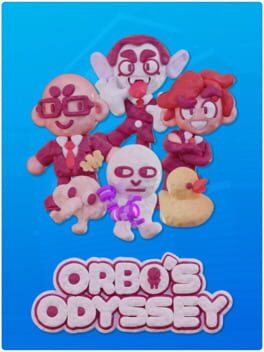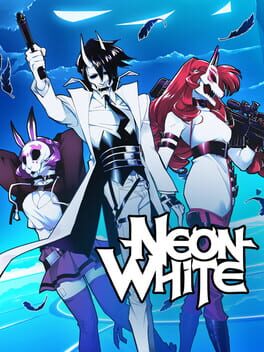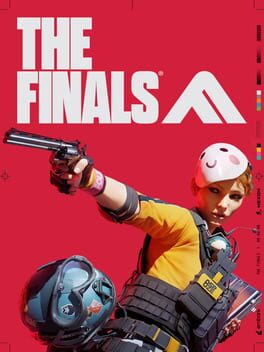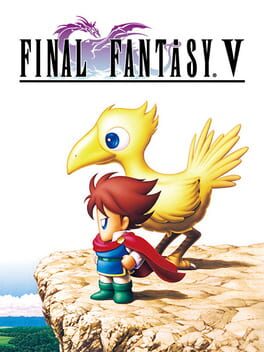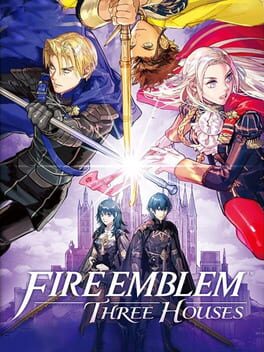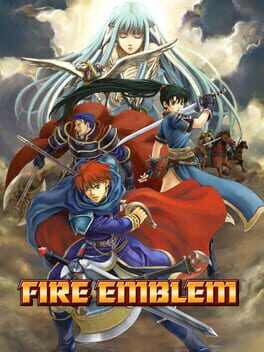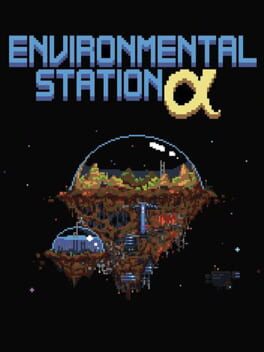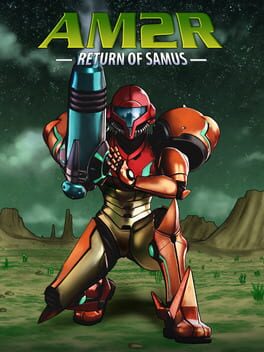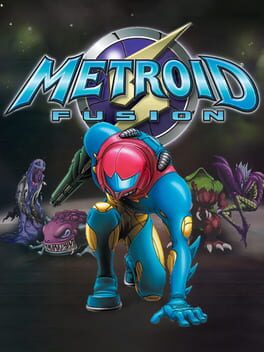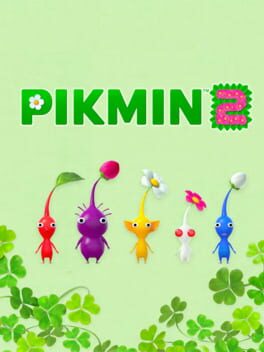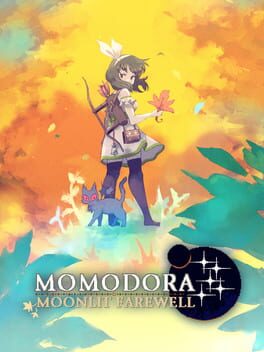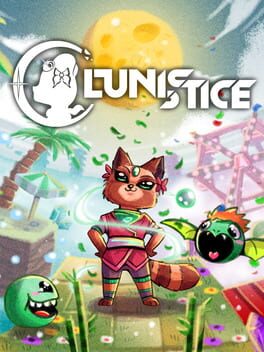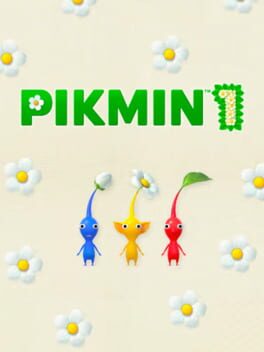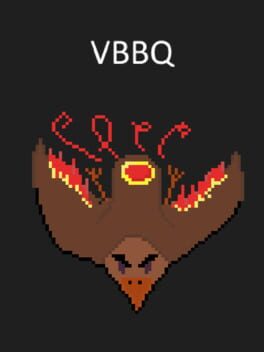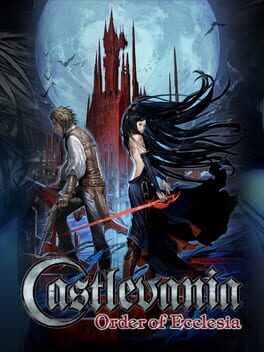LordIce5
2023
2022
I don't really have a lot to say about this game. It's very tightly designed with kickass levels that are surprisingly fun to dick around in even if you're not chasing better times. I think the writing, while nothing amazing, is a lot more charming than people give it credit for. And on top of that, the music is alright. It's fitting for the game and really good, but I've seen the sentiment thrown around that it's not music you'd choose to listen to anywhere else, and I'd have to agree with that assessment.
2023
I'm not an FPS guy. It's not a genre I really enjoy spending my time in. However, The Finals has managed to become the one FPS I truly love. Destructible environments are always fun. The modes seem really unique. The gadgets and specializations are really fun. It's just an overall really fun game that I enjoy playing alone or with my friends.
1992
I don't always beat games right away, and that was especially true in middle school, where I managed to hoard all the Final Fantasies on the Google Playstore on my phone, just to end up beating none of them on that platform. Hell, I didn't get close with any of them. However, with that in mind, FFV has been a top 3 Final Fantasy for me ever since I got into this series, and about seven and a half years later, that still tracks.
It all has to do with the game's job system. I don't think Final Fantasy V implemented it the best (See Bravely Default and Bravely Second for my favorite implementation), but Final Fantasy V's job system is truly something special, as well as being extremely revolutionary for the time. The format is genius: letting you level up jobs separate from character level, switch jobs whenever with no drawbacks, and most importantly, get rewarded for leveling jobs by getting new abilities you can use on other jobs. It all clicks together so seamlessly.
However, I will say that there's a few things this edition of the job system does suboptimally. First is how lopsided some jobs feel. For example, the Knight is a very early tank sort of job that across 6 levels gives you some useful passives, a command, and some passives that allow you to equip certain equipment types on jobs you normally would not be able to, and this is on a decent ABP curve too. Berserker, on the other hand, is a job that is a bitch to use because all you can do is attack with no discretion, and it has 2 levels. The first gives you the Berserk passive which is an absolute liability (especially when you can temporarily inflict Berserk later on if you REALLY wanted to), and then the ability to equip axes, a widely absent weapon type, on any job. And these two shitty skills are even less worth your trouble given that they are on an extremely steep curve of 100 and 400 ABP respectively (for context, random encounters will rarely give you above 4 ABP a battle until the endgame). It feels like some jobs are well thought out progression-wise (like the mages having nominally quick progression so you can use your spells elsewhere pretty quickly), and others are very underbaked.
Also I have a pet peeve with how Freelancer/Mime work with other jobs. Each base stat is inherited from the highest one among jobs you have mastered, which is really cool and incentivizes using different jobs. The problem? There are four base stats, and three jobs give you the best results. Seriously! I get archetypally how this job works, but Monk should not have been able to double dip! It's not hard to spread 4 instances of a highest stat across 4 jobs, and they messed it up! It's not the end of the world, but it really bugs me.
Outside of my gripes and the job system, FFV is a lighthearted game with a story that pushes zero envelopes. It is true comfort food with a heart of gold, and I enjoy that. The spritework is absolutely amazing, being the first Square game imo to really look like a SFC/SNES game instead of a more colorful NES game. Also the music is good, not really my cup of tea and heavily carried by Battle on the Big Bridge (a song that I'm constantly conflicted on if I love it or if it's really overrated), but still good. The star of the show here really is the job system.
For all that, I'd give this game a solid 9/10
Also, whoever thinks Shinryu is a harder superboss than Omega is actually delusional.
It all has to do with the game's job system. I don't think Final Fantasy V implemented it the best (See Bravely Default and Bravely Second for my favorite implementation), but Final Fantasy V's job system is truly something special, as well as being extremely revolutionary for the time. The format is genius: letting you level up jobs separate from character level, switch jobs whenever with no drawbacks, and most importantly, get rewarded for leveling jobs by getting new abilities you can use on other jobs. It all clicks together so seamlessly.
However, I will say that there's a few things this edition of the job system does suboptimally. First is how lopsided some jobs feel. For example, the Knight is a very early tank sort of job that across 6 levels gives you some useful passives, a command, and some passives that allow you to equip certain equipment types on jobs you normally would not be able to, and this is on a decent ABP curve too. Berserker, on the other hand, is a job that is a bitch to use because all you can do is attack with no discretion, and it has 2 levels. The first gives you the Berserk passive which is an absolute liability (especially when you can temporarily inflict Berserk later on if you REALLY wanted to), and then the ability to equip axes, a widely absent weapon type, on any job. And these two shitty skills are even less worth your trouble given that they are on an extremely steep curve of 100 and 400 ABP respectively (for context, random encounters will rarely give you above 4 ABP a battle until the endgame). It feels like some jobs are well thought out progression-wise (like the mages having nominally quick progression so you can use your spells elsewhere pretty quickly), and others are very underbaked.
Also I have a pet peeve with how Freelancer/Mime work with other jobs. Each base stat is inherited from the highest one among jobs you have mastered, which is really cool and incentivizes using different jobs. The problem? There are four base stats, and three jobs give you the best results. Seriously! I get archetypally how this job works, but Monk should not have been able to double dip! It's not hard to spread 4 instances of a highest stat across 4 jobs, and they messed it up! It's not the end of the world, but it really bugs me.
Outside of my gripes and the job system, FFV is a lighthearted game with a story that pushes zero envelopes. It is true comfort food with a heart of gold, and I enjoy that. The spritework is absolutely amazing, being the first Square game imo to really look like a SFC/SNES game instead of a more colorful NES game. Also the music is good, not really my cup of tea and heavily carried by Battle on the Big Bridge (a song that I'm constantly conflicted on if I love it or if it's really overrated), but still good. The star of the show here really is the job system.
For all that, I'd give this game a solid 9/10
Also, whoever thinks Shinryu is a harder superboss than Omega is actually delusional.
I haven't finished this revisit, but I don't think the back third of this game is going to change my mind too much, especially if I remember the story from my first playthrough like I think I do.
Fire Emblem: Three Houses, is a game that lives and dies by its scope. When you get down to it, I'd say that Three Houses easily sits in league with Gaiden and Genealogy of the Holy War as the series' black sheep. I would say that with a more focused perspective than a playthrough I took a two-year hiatus in the middle of, I have come to appreciate it more, but I have also come to notice some much more noticeable shortcomings.
First off, Fodlan is probably the second most interesting world in Fire Emblem to me, only behind Jugdral. The game's writers swung for the fences in making a lore-saturated, interesting setting, and I would say they largely succeeded. The worldbuilding in this game is incredible. Hell, I think a lot of the auxiliary writing as I am calling it is incredible. I really liked a majority of the supports. My one gripe is that the beginning of each chain usually starts pretty similar, with each character's arc starting from roughly the same circumstance in most of their conversations. However, I felt this game shined at making these similar setups deviate in such a way that each support pairing brought something new to the table.
On the gameplay side of things, Gauntlets are a fun addition, acting like brave weapons that exist outside the weapon triangle, though it sucks that mounted units can't use them. Combat Arts from Echoes are back, and while I am not too terribly keen on them, I respect the work done to make them coexist and not be proprietary to specific weapons. The Battalion and Gambit systems are a powerful addition to combat. Class changing is at its most flexible, which can lead to some goofy builds, and is bolstered by a stupidly robust character building system. With a lot of these features, it helps make Three Houses' combat feel like its own, as opposed to, say, the three GBA games, which can kind of easily mesh together to the uninitiated.
However, not everything is great. As I mentioned, Three Houses lives and dies by its scope, and in some aspects, I believe it really falls.
The most obvious to veteran players is the amount of map reuse. As a fan of Shadows of Valentia, I'd be a massive hypocrite if I were to dog on Three Houses' map design for being repetitive. However, it should also be made known that Three Houses is a big game, a big game with a hundred and twenty chapters and paralogues if I am doing my math correctly. Out of what I have played, I have seen maybe twenty maps, and a lot of those are copied and pasted between paralogues, auxiliary battles, and even some chapter maps. Three Houses' map identity problem is probably a lot worse, because at least a lot of Shadows of Valentia/Gaiden's map reuse is limited to insiginificant field skirmishes or random encounters in dungeons. Three Houses has paralogues and main chapters without unique maps, which is egregious. I get that this has to do probably with the admittedly unfeasible nature of making 120+ maps for this game, but at least come closer to that benchmark than 20, or consider maybe scaling the game down a bit. (Also, I want to clarify I have no issue with maps made specifically for grinding being reused, just main maps and paralogues.)
EDIT: I just remembered Fates exists, which is a game with, what, 70~80 maps? And disregarding the Rainbow Sage map being reused iirc and Fates taking place in a much more aesthetically chaotic setting, it still manages to have mostly unique maps, which reflects even worse on Three Houses.
I mentioned the auxiliary writing of this game, and that's because the main writing that I have seen tends to skew weak. Don't get me wrong, the main story has some absolutely outstanding moments and I fully appreciate the ambition and intent, but upon getting to Azure Moon proper again, I just remembered how boring it got, being a pretty generic story of driving out invaders, with the twist of having to bring Dimitri back from the brink of insanity. It's not bad, but I will say it's disappointing, especially coming off the back of the much more interesting White Clouds (the academy section).
Garreg Mach is too big and tedious. I am far from the first person to make this point, but good god it's said for a reason. The size I'm okay with, but it becomes an issue with the incessant fetch quests that have you running all over the place just wasting more time. I hate lost items with a burning passion.
This game is big, and one byproduct of that which I've noticed is that if you take the time to make sure your units are adequately prepared for each fight, like I did when starting out, that is a shitload of menus you need to navigate through. I understand why there's so many menus, but it gets tedious as you obtain more equipment, unlock new skills, etc. At some point, I just stopped caring unless I had someone with a broken weapon or was given an exceptionally cool new toy to play with.
Three Houses has an OST, and that OST has some battle theme bops. The problem? That's all that really sticks out to me. It makes this OST, which is actually quite sizable, feel small and repetitive given the same battle track and boss theme play in a majority of a segment's maps.
Fire Emblem: Three Houses is a very ambitious game, and one that I respect wholly for its worldbuilding, supports, and gameplay. However, Three Houses may live fully by its scope in those areas, issues like the repetition of maps, Garreg Mach, and even something as small as the tedium of managing so many menus so often display how Three Houses dies by that scope and creates a game that people have notoriously burned out on, including me when this game launched.
Fire Emblem: Three Houses, is a game that lives and dies by its scope. When you get down to it, I'd say that Three Houses easily sits in league with Gaiden and Genealogy of the Holy War as the series' black sheep. I would say that with a more focused perspective than a playthrough I took a two-year hiatus in the middle of, I have come to appreciate it more, but I have also come to notice some much more noticeable shortcomings.
First off, Fodlan is probably the second most interesting world in Fire Emblem to me, only behind Jugdral. The game's writers swung for the fences in making a lore-saturated, interesting setting, and I would say they largely succeeded. The worldbuilding in this game is incredible. Hell, I think a lot of the auxiliary writing as I am calling it is incredible. I really liked a majority of the supports. My one gripe is that the beginning of each chain usually starts pretty similar, with each character's arc starting from roughly the same circumstance in most of their conversations. However, I felt this game shined at making these similar setups deviate in such a way that each support pairing brought something new to the table.
On the gameplay side of things, Gauntlets are a fun addition, acting like brave weapons that exist outside the weapon triangle, though it sucks that mounted units can't use them. Combat Arts from Echoes are back, and while I am not too terribly keen on them, I respect the work done to make them coexist and not be proprietary to specific weapons. The Battalion and Gambit systems are a powerful addition to combat. Class changing is at its most flexible, which can lead to some goofy builds, and is bolstered by a stupidly robust character building system. With a lot of these features, it helps make Three Houses' combat feel like its own, as opposed to, say, the three GBA games, which can kind of easily mesh together to the uninitiated.
However, not everything is great. As I mentioned, Three Houses lives and dies by its scope, and in some aspects, I believe it really falls.
The most obvious to veteran players is the amount of map reuse. As a fan of Shadows of Valentia, I'd be a massive hypocrite if I were to dog on Three Houses' map design for being repetitive. However, it should also be made known that Three Houses is a big game, a big game with a hundred and twenty chapters and paralogues if I am doing my math correctly. Out of what I have played, I have seen maybe twenty maps, and a lot of those are copied and pasted between paralogues, auxiliary battles, and even some chapter maps. Three Houses' map identity problem is probably a lot worse, because at least a lot of Shadows of Valentia/Gaiden's map reuse is limited to insiginificant field skirmishes or random encounters in dungeons. Three Houses has paralogues and main chapters without unique maps, which is egregious. I get that this has to do probably with the admittedly unfeasible nature of making 120+ maps for this game, but at least come closer to that benchmark than 20, or consider maybe scaling the game down a bit. (Also, I want to clarify I have no issue with maps made specifically for grinding being reused, just main maps and paralogues.)
EDIT: I just remembered Fates exists, which is a game with, what, 70~80 maps? And disregarding the Rainbow Sage map being reused iirc and Fates taking place in a much more aesthetically chaotic setting, it still manages to have mostly unique maps, which reflects even worse on Three Houses.
I mentioned the auxiliary writing of this game, and that's because the main writing that I have seen tends to skew weak. Don't get me wrong, the main story has some absolutely outstanding moments and I fully appreciate the ambition and intent, but upon getting to Azure Moon proper again, I just remembered how boring it got, being a pretty generic story of driving out invaders, with the twist of having to bring Dimitri back from the brink of insanity. It's not bad, but I will say it's disappointing, especially coming off the back of the much more interesting White Clouds (the academy section).
Garreg Mach is too big and tedious. I am far from the first person to make this point, but good god it's said for a reason. The size I'm okay with, but it becomes an issue with the incessant fetch quests that have you running all over the place just wasting more time. I hate lost items with a burning passion.
This game is big, and one byproduct of that which I've noticed is that if you take the time to make sure your units are adequately prepared for each fight, like I did when starting out, that is a shitload of menus you need to navigate through. I understand why there's so many menus, but it gets tedious as you obtain more equipment, unlock new skills, etc. At some point, I just stopped caring unless I had someone with a broken weapon or was given an exceptionally cool new toy to play with.
Three Houses has an OST, and that OST has some battle theme bops. The problem? That's all that really sticks out to me. It makes this OST, which is actually quite sizable, feel small and repetitive given the same battle track and boss theme play in a majority of a segment's maps.
Fire Emblem: Three Houses is a very ambitious game, and one that I respect wholly for its worldbuilding, supports, and gameplay. However, Three Houses may live fully by its scope in those areas, issues like the repetition of maps, Garreg Mach, and even something as small as the tedium of managing so many menus so often display how Three Houses dies by that scope and creates a game that people have notoriously burned out on, including me when this game launched.
This feels like easily the most no-nonsense version of Fire Emblem as we know it today. There's no skills. The weapon triangle is there. All the basic classes we all know and love are there. Hell, there's no hub. It feels like Fire Emblem at its most basic, in a good way of course. It's good, nothing mindblowing, but good.
2002
My opinion on this game did probably the biggest 180. At first, I was thoroughly unimpressed with the more on-rails approach this game has become notorious for. However, in hindsight, while Metroid Fusion's formatting takes it out of the running imo for the best metroidvania or the best Metroid, the way that this game subverts the established formula to fit the story/atmosphere is very well executed. The game is overall really solid and I enjoyed it more than I expected to.
Here's some random gripes though:
- I had to consult a map every now and then because the routes you are expected to take to your objective can be painfully obtuse. While it can be argued that you are expected to take notice of your surroundings already, it is a principle of good design to make the way progess to be clear and intuitive, and Fusion has a handful of times where it fails to meet that principle.
- This game tends to discourage non-story-related backtracking, which is fine in concept, but it is also frustrating when the game relatively often locks you out of areas temporarily. Have fun waiting until the last minute to get every upgrade, just to learn that 90% of the game is locked away permanently (still a tad upset).
- Fusion's bosses aren't that good. Either they are pathetically easy, or they are kinda bullshit. I want to focus on the latter, because that it a bold take. A lot of Fusion's harder bosses felt like a mix of two issues, speed and an overabundance of active hitboxes. Samus is not super nimble, and she can't avoid enemies on a dime. However, bosses like Serris and SA-X move just fast enough that they make dodging feel proactive instead of reactive. It feels like bosses like these were designed for a game with a faster character. When it comes to an overabundance of active hitboxes, it comes down to bosses taking up an obscene amount of the screen, like Nettori, Nightmare, and the Omega Metroid. With Nettori in particular, it is excruciating to get through that fight without taking a truckload of damage. When ~70%-80% of the screen hurts you, it makes for some annoying-ass encounters.
Here's some random gripes though:
- I had to consult a map every now and then because the routes you are expected to take to your objective can be painfully obtuse. While it can be argued that you are expected to take notice of your surroundings already, it is a principle of good design to make the way progess to be clear and intuitive, and Fusion has a handful of times where it fails to meet that principle.
- This game tends to discourage non-story-related backtracking, which is fine in concept, but it is also frustrating when the game relatively often locks you out of areas temporarily. Have fun waiting until the last minute to get every upgrade, just to learn that 90% of the game is locked away permanently (still a tad upset).
- Fusion's bosses aren't that good. Either they are pathetically easy, or they are kinda bullshit. I want to focus on the latter, because that it a bold take. A lot of Fusion's harder bosses felt like a mix of two issues, speed and an overabundance of active hitboxes. Samus is not super nimble, and she can't avoid enemies on a dime. However, bosses like Serris and SA-X move just fast enough that they make dodging feel proactive instead of reactive. It feels like bosses like these were designed for a game with a faster character. When it comes to an overabundance of active hitboxes, it comes down to bosses taking up an obscene amount of the screen, like Nettori, Nightmare, and the Omega Metroid. With Nettori in particular, it is excruciating to get through that fight without taking a truckload of damage. When ~70%-80% of the screen hurts you, it makes for some annoying-ass encounters.
2023
Pikmin 2 is a wholehearted step above its predecessor. Pikmin 2 introduces new pikmin, new enemies, and a brand new gameplay loop, all of which work super well.
A testament to Pikmin 2's design is the two reused overworld maps. In topography, they are the same as Pikmin 1. However, their more busy design lends itself beautifully, replacing simple affairs under a time limit with very involved areas geared towards exploring at a slower rate.
However, while I see the vision, and respect it fully, this game is easily the most stressful I have ever played. Pikmin 2 introduces dungeons, multi-floor affairs where you go down each floor, collecting treasures, and defeating a boss at the end. These are the only places you can get the new Purple and White Pikmin (a decision that grew on me given how powerful they are), and Pikmin accrual in general is VERY limited. If Pikmin die, which is bound to happen, you have to deal with it.
I am not going to mince words, Pikmin 2's dungeons killed my enjoyment for Pikmin 2. I liked the original game's (and the overworld of 2 to an extent) gameplay loop of managing time and resources to get the most done by the end of the day. Overworld Pikmin tests your time management in a very clever and well executed way. Dungeon Pikmin throws this out the window. I can deal with how brutal the dungeons are. They are patently a great test of skill for the player when it comes to dealing with enemies while trying to take minimal to no casualties. In one dungeon, I had too many blue pikmin die, meaning I had one too few blue pikmin to move this treasure in the water, so I had to redo the dungeon and play smarter to make sure I got it.
What made me loathe dungeons was how long they are. Dungeons in this game are absolute slogs with no time limit. Some dungeons took half an hour, while most took a good hour of neurotically maneuvering Pikmin to neutralize threats safely and get every treasure, for if you miss a treasure, that's another run through the whole dungeon. The amount of time these dungeons commanded ran counter to what I believe made Pikmin 1 great in the first place, and all that time spent in dungeons wore down at my patience and made me despise them.
I got about halfway through the game, and knowing I had some evil dungeons ahead of me had me very worried. For the sake of not driving myself crazy, I had to put this game down. I commend it for what it is, I really do, and I see the hype. However the tedium of the dungeons stressed me out to the point where the game was feeling less like a fun experience that I wanted to engage with, and more like a stressful chore.
A testament to Pikmin 2's design is the two reused overworld maps. In topography, they are the same as Pikmin 1. However, their more busy design lends itself beautifully, replacing simple affairs under a time limit with very involved areas geared towards exploring at a slower rate.
However, while I see the vision, and respect it fully, this game is easily the most stressful I have ever played. Pikmin 2 introduces dungeons, multi-floor affairs where you go down each floor, collecting treasures, and defeating a boss at the end. These are the only places you can get the new Purple and White Pikmin (a decision that grew on me given how powerful they are), and Pikmin accrual in general is VERY limited. If Pikmin die, which is bound to happen, you have to deal with it.
I am not going to mince words, Pikmin 2's dungeons killed my enjoyment for Pikmin 2. I liked the original game's (and the overworld of 2 to an extent) gameplay loop of managing time and resources to get the most done by the end of the day. Overworld Pikmin tests your time management in a very clever and well executed way. Dungeon Pikmin throws this out the window. I can deal with how brutal the dungeons are. They are patently a great test of skill for the player when it comes to dealing with enemies while trying to take minimal to no casualties. In one dungeon, I had too many blue pikmin die, meaning I had one too few blue pikmin to move this treasure in the water, so I had to redo the dungeon and play smarter to make sure I got it.
What made me loathe dungeons was how long they are. Dungeons in this game are absolute slogs with no time limit. Some dungeons took half an hour, while most took a good hour of neurotically maneuvering Pikmin to neutralize threats safely and get every treasure, for if you miss a treasure, that's another run through the whole dungeon. The amount of time these dungeons commanded ran counter to what I believe made Pikmin 1 great in the first place, and all that time spent in dungeons wore down at my patience and made me despise them.
I got about halfway through the game, and knowing I had some evil dungeons ahead of me had me very worried. For the sake of not driving myself crazy, I had to put this game down. I commend it for what it is, I really do, and I see the hype. However the tedium of the dungeons stressed me out to the point where the game was feeling less like a fun experience that I wanted to engage with, and more like a stressful chore.
This is up there in terms of metroidvanias for me. My only real issue is that although the game is really easy in general, the endgame's difficulty is particularly low.
Also about the post-game nightmare bosses, those are not how you design harder boss fights. Putting instakill hazards into what is ostensibly the same fight is just lazy and pathetic.
Also about the post-game nightmare bosses, those are not how you design harder boss fights. Putting instakill hazards into what is ostensibly the same fight is just lazy and pathetic.
2022
I've been on an indie platformer kick lately, and I found this game on steam looking through the main store page for chump change, so I decided after giving the demo a shot to hop on.
And speaking of this game being just five bucks USD, my kneejerk reaction was that this game has NO business being five bucks. While the game is pretty short, spanning 15 levels, it seemed blatantly easy to me at least to feel like I was ripping off the devs for the heart, soul, and competent design that had to go into this game.
The gameplay to me feels like if Sonic the Hedgehog and Crash Bandicoot had a kid. It has a speed factor to it like Sonic, as well as set pieces like grind rails that tend to get associated with Sonic. However it has the kind of linear exploration elements that Crash fans may like, with the game even having a spiritual version of box gems. Despite how strange that description may come across, it works super well, with tight platforming, well thought-out levels, and a satisfying gameplay loop that makes 100%'ing a game not feel like a chore.
The game looks great, regardless of if you scale it up or leave the pixel filter on like I did. It's nothing mind blowing, but it has this late-90's-3D-platformer-charm that just makes me happy. On top of this all, the music is amazing, a trait I was not expecting from a decently obscure, 5$ indie game.
I have a couple of gripes. The main one is that the enemies lack teeth (figuratively; literally they're toothy little goobers). They're never really threatening to the point they prove a challenge, and as such felt lacking (There is a character in this game that can't attack, so maybe playing as him would change my mind. However, I doubt it.). Also, there isn't much in the way of enemy variety. I don't mean to ask for a massive bestiary, but at least one or two new monsters to keep things fresh from world to world.
My other gripe is moreso a pet peeve, and that's the fact that the rhythm platforms that show up in worlds 4 and 7 don't really go off of an audio cue, and instead go off of a little visual cue at the bottom, where each beat cycles in a row between being hit. It's just unintuitive to have a rhythm element and not tie it to an audio cue imo.
Despite my gripes, this is an absolutely amazing indie game, and I wholeheartedly recommend it to anyone.
And speaking of this game being just five bucks USD, my kneejerk reaction was that this game has NO business being five bucks. While the game is pretty short, spanning 15 levels, it seemed blatantly easy to me at least to feel like I was ripping off the devs for the heart, soul, and competent design that had to go into this game.
The gameplay to me feels like if Sonic the Hedgehog and Crash Bandicoot had a kid. It has a speed factor to it like Sonic, as well as set pieces like grind rails that tend to get associated with Sonic. However it has the kind of linear exploration elements that Crash fans may like, with the game even having a spiritual version of box gems. Despite how strange that description may come across, it works super well, with tight platforming, well thought-out levels, and a satisfying gameplay loop that makes 100%'ing a game not feel like a chore.
The game looks great, regardless of if you scale it up or leave the pixel filter on like I did. It's nothing mind blowing, but it has this late-90's-3D-platformer-charm that just makes me happy. On top of this all, the music is amazing, a trait I was not expecting from a decently obscure, 5$ indie game.
I have a couple of gripes. The main one is that the enemies lack teeth (figuratively; literally they're toothy little goobers). They're never really threatening to the point they prove a challenge, and as such felt lacking (There is a character in this game that can't attack, so maybe playing as him would change my mind. However, I doubt it.). Also, there isn't much in the way of enemy variety. I don't mean to ask for a massive bestiary, but at least one or two new monsters to keep things fresh from world to world.
My other gripe is moreso a pet peeve, and that's the fact that the rhythm platforms that show up in worlds 4 and 7 don't really go off of an audio cue, and instead go off of a little visual cue at the bottom, where each beat cycles in a row between being hit. It's just unintuitive to have a rhythm element and not tie it to an audio cue imo.
Despite my gripes, this is an absolutely amazing indie game, and I wholeheartedly recommend it to anyone.
2023
My main gripe for this game comes from the format. I like one big, dense map to run around, and this game doesn't deliver for the first half, and even then Dracula's Castle is pretty linear. The game is still plenty enjoyable however, having some of the cooler and more creative bosses in an Igavania Castlevania. The game's art direction is doing the whole, "late 2000's gritty aesthetic" right. The music downright fucks from beginning to end. I wasn't too keen on combat this time around, but I respect what it was going for wholly.
Also as a pro vibe chaser, this game felt really surreal, being the final mainline Castlevania to most likely ever come out. The more muted look of the game kinda felt like how life was being sucked out of the franchise. Castlevania was in its death throes, but goddamn did it go out with honor.
Also as a pro vibe chaser, this game felt really surreal, being the final mainline Castlevania to most likely ever come out. The more muted look of the game kinda felt like how life was being sucked out of the franchise. Castlevania was in its death throes, but goddamn did it go out with honor.
